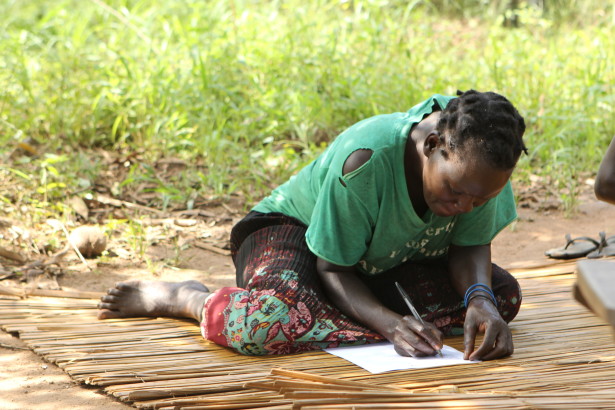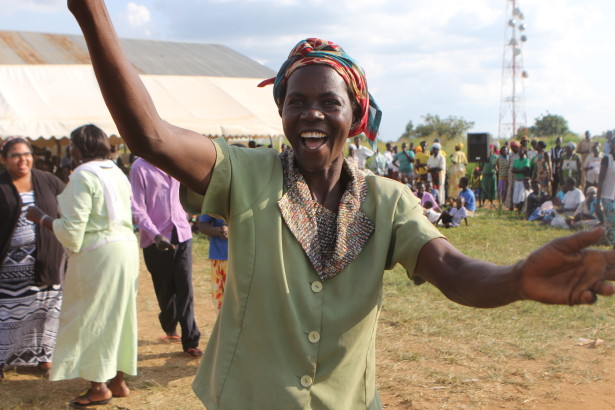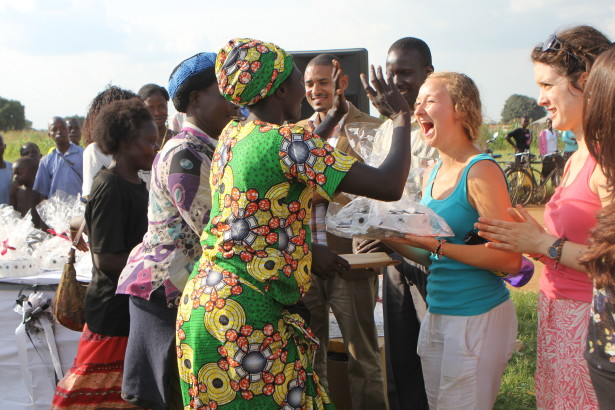“Literacy is a bridge from misery to hope. It is a tool for daily life in modern society. It is a bulwark against poverty and a building block of development, an essential complement to investments in roads, dams, clinics, and factories. Literacy is a platform for democratization and a vehicle for the promotion of cultural and national identity. Especially for girls and women, it is an agent of family health and nutrition. For everyone everywhere, literacy is, finally, the road to human progress and the means through which every man, woman, and child can realize his or her full potential.”
The above quote from Kofi Annan, the former Secretary-General of the United Nations, is a poignant reminder of the transformative power of literacy. Approximately 12 percent, or nearly 800 million, of the world’s people are functionally illiterate, according to UNESCO.

A VSLA group member completes her Functional Adult Literacy exam. The test covers information learned in a yearlong curriculum and gauges member’s proficiency in basic reading, writing and mathematics skills.
In June, the final 90 of Invisible Children’s 161 Village Savings and Loan Association (VSLA) groups graduated from their yearlong Functional Adult Literacy (FAL) course. A total of 1,969 people from these groups successfully completed the course with passing results on their final exams. This includes 671 males and 1,298 females, all members of rural communities in Gulu and Nwoya districts in northern Uganda.
While these groups will continue saving through VSLA, their completion of the one-year FAL course marks them as meeting international standards of literacy.

Some of the lowest global literacy rates are found in sub-Saharan Africa. For adults, literacy rates in sub-Saharan Africa increased from 53 percent in 1990, to over 60 percent in 2000 and a projected 66 percent for 2015.
But, while this represents a dramatic improvement and increased access to educational opportunities for many, others, especially in war-affected communities like those where Invisible Children works, lack even basic skills in numeracy, reading and writing.
Invisible Children held two graduation ceremonies to celebrate the successes of our FAL students. Attendees included many Invisible Children staff, our #zeroLRA trip winners, a number of political and cultural leaders within the districts where the groups live, and a representative from our partner TechnoServe.
TechnoServe is a nonprofit organization that emphasizes using business solutions as a means of alleviating poverty in the developing world. A generous grant from the organization has supported Invisible Children’s Livelihoods programs since 2011, committed to increasing the income of rural community members, especially smallholder cotton farmers, in northern Uganda.

Based on their fundraising during our #zeroLRA campaign, 15 individuals came to Uganda in June to visit Invisible Children’s programs on the ground. They attended FAL graduation and celebrated with thousands of community members.
The completion of the FAL curriculum is an important marker in their empowerment as small business owners. In a recent report, our Livelihoods team suggests that Invisible Children and TechnoServe continue to expand the program due to the demanding need of adult literacy skills throughout the region. They hope to work continue working with local leaders in order to encourage graduated members to continue reading and writing in order to improve their literacy all the more.
Think people should hear about this?